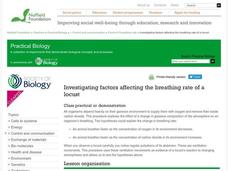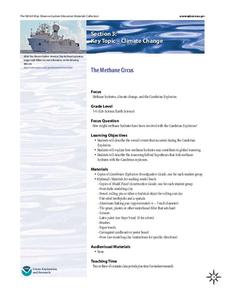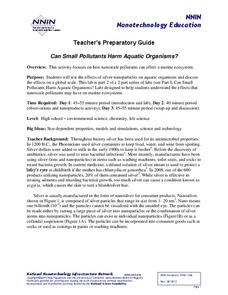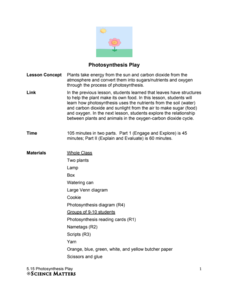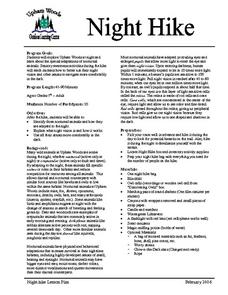Curated OER
Animals of the Arctic
Sixth graders research an Arctic animal. They survey the questions in the Animal Report in order to conduct their research. They investigate their chosen animal by using the Internet, library books and reference books.
Curated OER
Papier Mache Animals Sculptures
Fourth graders construct papier mache sculptures that emphasize texture, form and color. Each student chooses and constructs a unique papier mache sculpture of a farm animal..
Curated OER
Animals and Humans
Students identify the functions of various body parts. They participate in the "Head, Shoulders, Knees, and Toes" song, draw a picture of themselves and other mammals, and create a traced outline of their body that they add features to....
EngageNY
Grade 9 ELA Module 3, Unit 1, Lesson 2
Autism isn't an illness or a disability. In the first chapter of Animals in Translation, we learn about Temple Grandin's unique ability to understand animals through her experience with autism. Having read pages four through eight for...
Rainforest Alliance
How Do Jaguars and Howler Monkeys in Belize Depend on Us?
How does weather play a role in the lives of land and sea creatures? Find out with a instructional activity focused on habitats and the ways animals from different homes are connected. Here, learners explore how the life of a...
Nuffield Foundation
Investigating Factors Affecting the Breathing Rate of a Locust
Do animals breathe faster when given more oxygen or more carbon dioxide? Young scientists observe the respiration rates of locusts under a variety of gas concentrations to answer that very question. They collect data, analyze the...
National Wildlife Federation
Who Is Faster?
Am I going to catch it? Individuals time how long it takes them to walk, jog, and run a given distance and calculate their speed. They then research two animals and find their speeds. Using a chart, pupils compare the speeds of the...
NOAA
The Methane Circus
Step right up! An engaging research-centered lesson, the third in a series of six, has young archaeologists study the amazing animals of the Cambrian explosion. Working in groups, they profile a breathtaking and odd creature and learn...
National Nanotechnology Infrastructure Network
Can Small Pollutants Harm Aquatic Organisms?
Nanoparticles have toxic effects on plant and animal life—even though you can't see them. The second instructional activity of a two-part series has young scientists conduct an experiment that exposes plant and animals to nanoparticle...
EngageNY
Grade 9 ELA Module 3, Unit 1, Lesson 1
Clear up the misconceptions about autism and individuals on the autism spectrum with an inquiry-based instructional activity. As ninth graders read the first four pages of Temple Grandin's Animals in Translation: Using the Mysteries of...
Curated OER
Animals of the Lost City
Begin with a demonstration of exothermic reactions and discussion of chemosynthesis. Your aspiring oceanographers research vent communities and then craft a mural of a vent community. This is a terrific method of introducing learners to...
Curated OER
Minimal Animals
Have fun creating imaginary creatures with this symmetry lesson plan! Your class will paint one half of their imaginary creature, fold their paper in half, which will result in a symmetrical figure. What a great art project to combine...
Baylor College
Needs of Living Things: Pre-Assessment
Determine your class's prior knowledge about the necessities of life with this pre-assessment for a unit on living things. Learners draw pictures of themselves with all the things they need to live, grow, and survive. These drawings will...
Baylor College
Needs of Living Things: Post-Assessment
Assess your class's knowledge of the needs of living things with the final lesson in a series. Given a large piece of paper and coloring utensils, young scientists draw a picture of themselves and a plant or animal of their choosing,...
Science Matters
Photosynthesis Play
Photosynthesis seems nothing short of magic: a little carbon dioxide and water, add energy, and poof, you get food! A thorough, collaborative lesson teaches youth the process of photosynthesis thanks to a skit they perform with a group...
Purdue University
Coloration Exploration
Finding an animal in nature can be like a game of hide and seek. A thorough lesson explores different coloration strategies of animals. Pupils complete look-and-find puzzles and coloring sheets to differentiate between different types of...
Curated OER
How Much Sleep Do Animals Need?
Second graders read and complete "Guess How Much Sleep These Animals Need" worksheet. They use the chart and record how much sleep different animals get until the chart is full. They then discuss why sleep is important.
Curated OER
Night Hike
Students explore Upham Woods at night and investigate about the special adaptations of nocturnal animals. They identify three nocturnal animals and how they are adapted to the night. Students explain what night vision is and how it works.
Curated OER
What's Wild? What's Not?
Students complete activities to differentiate between wild and domestic animals. In this animal types lesson plan, students bring stuffed animals to class and pictures from magazines or newspaper. Students put their stuffed animals in a...
Curated OER
Critters in Your Own Backyard
Students identify various animals and their habitats, as well as their specific traits In this animal habitat lesson, students list animals they've seen in their backyard. Students select one animal and do research. Students then answer...
Curated OER
Farm Pictures
Students paint farm animals. In this farm animal lesson, students paint pictures of farm animals during one thirty minute session. They cut out and glue the pictures on a picture of a farm which they also painted in the second session.
Curated OER
Animal Babies on the Farm
Students identify different farm animals and match farm animal babies to their parent(s). They recognize more specific gender terminology for farm animals.
Curated OER
Fun On The Farm
Students experiment with a variety of resources to study about sounds and their sources (weather, animal, and transportation). They compare size, structure, and basic needs of living things. Each student studies about farm animals,...
Curated OER
The New Zoo
Young scholars explore animal characteristics by researching the animals in a zoo. In this video documentary lesson, students view the local zoo and create a documentary about a single animal they found at the zoo. Young scholars present...
Other popular searches
- Farm Animals
- Zoo Animals
- Nocturnal Animals
- Prehistoric Animals
- Arctic Animals
- Jungle Animals
- Plants and Animals
- Desert Animals
- Animals and Their Habitats
- Oviparous Animals
- Classification of Animals
- Winter Animals





